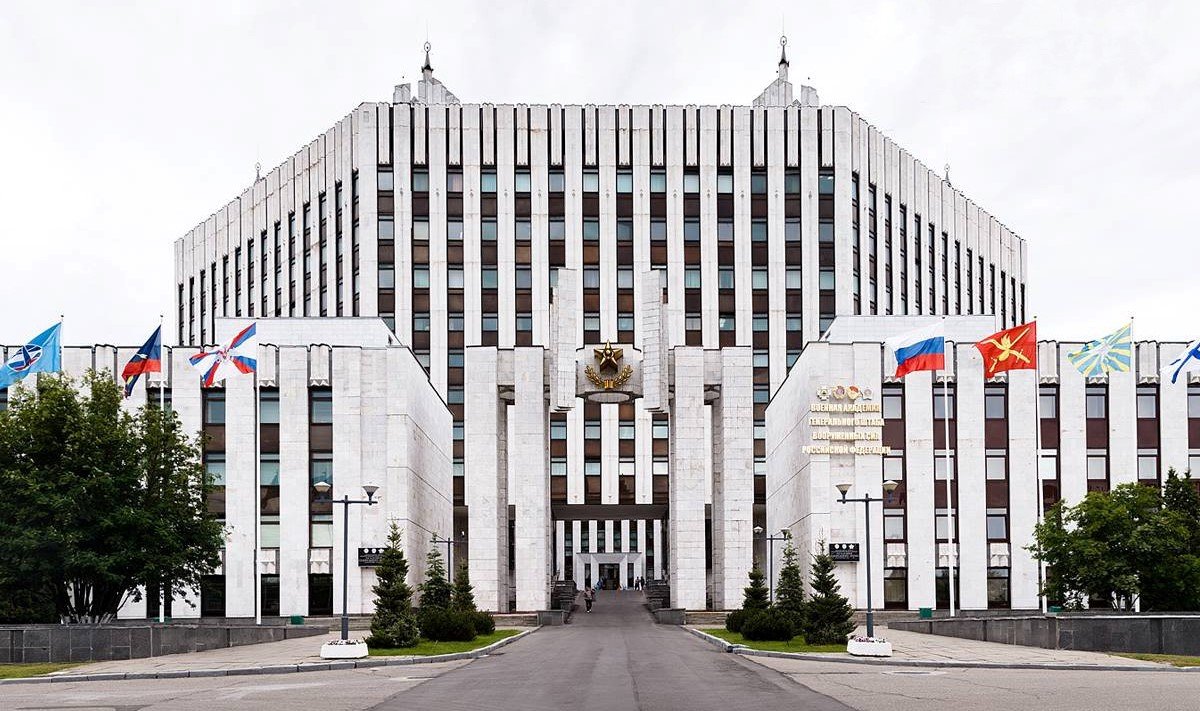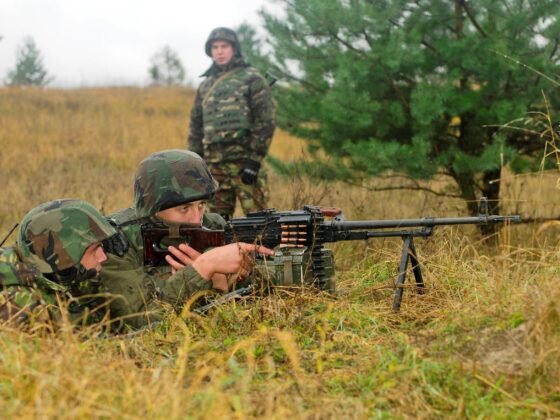(PONARS Eurasia Policy Memo) With Russian forces poised to invade Ukraine, there are signs of possible dissent amongst Russia’s upper echelons. Early February saw two publications by retired Russian military officers that are highly critical of plans for military action against Ukraine. These dissenting voices attracted attention in the mainstream Western and Russian press.
Western analysts are unsure what to make of the surfacing of dissenting voices on the periphery of the Russian military community. The consensus view is that these figures are far removed from the center of power and cannot be taken as representative of the views of the officer corps as a whole. Surveys suggest that there is strong support for President Vladimir Putin across all sections of the Russian elite—for his assertive foreign policy and the military in particular. However, it is highly unusual to see such critical commentary from retired senior officials who still have close ties to the military establishment. Is it a sign of important stirrings in the attitudes of the Russian officer corps? It is plausible that their ideas could gain traction in Russian military circles should a war in Ukraine go poorly. Further, these could be the early signs of more forthright political opposition in Russia.
Debates Behind Closed Russian Doors
Western analysts tend to assume that the Russian elite is monolithically united behind Putin and that his opinion is the only one that counts. While it is true that decision-making in Russia is extraordinarily centralized around the person of Putin, there are policy debates and power struggles behind closed doors. Differences of opinion can even be found among leaders of the security organs—the siloviki. And there are, of course, inter-service rivalries. It is former KGB officers who dominate Putin’s inner circle—but it is the armed forces who would bear the burden of extensive military operations in Ukraine.
The Russian president’s ultimatum to the United States in December has caused the biggest international crisis in Europe since the dissolution of the Soviet Union. A decision to launch new military action against Ukraine would have a momentous impact on Russia’s relations with the West and on Russian society. The Russian media has been vocal in blaming the crisis on the United States, claiming the need to protect Russian citizens in the breakaway Donbas from an imminent attack by Ukraine. The willingness of the Russian military to carry out an invasion of Ukraine is not questioned in Western media coverage of the planning for war, and there is no reason to doubt that they will carry out their orders. But we really don’t know what they are thinking.
Aside from the Ukrainian people and their forces, Russian service members would be the people most directly bearing the costs of Putin’s aggressive strategy. And their leaders stand to shoulder a good share of the blame if things go wrong. It is therefore not unreasonable to suppose that some may have grave concerns about Putin’s bellicose approach. As such, the appearance of critical commentary at this juncture bears careful scrutiny since it may be an early signal of broader pushback against the rush to war within the military ranks or against the continued prosecution of the war should it not be swift and successful. Hopefully, it will increase the pressure on Putin to step back from further escalation.
Some Elevated Voices
One early dissenter is retired Colonel Mikhail Khodarenok, a former General Staff officer. Khodarenok was born in 1954 and served in air defense before working in the administration of the General Staff from 1992-2000. Since then, he has been an author and journalist, serving as editor of the Military-Industry Courier, a daily paper with close ties to the military-industrial complex, from 2010-2015. He currently writes for Gazeta.ru and the radio station Vesti-FM.
In an article in the Independent Military Review published on February 3, Khodarenok was blistering in his attack on the rationale for military action against Ukraine. He warns that while “bloodthirsty politologists” predict an easy victory, “it will not be a walk in the park.” He sees the apparent faith in a single disabling mass blow by missile strikes as a revival of the Italian military theorist Giulio Douhet’s airpower doctrine of the 1930s. Ultimately, that strategy did not produce a victory for Adolf Hitler, nor did it work for Soviet forces against the Afghans and Chechens, who had no air force but nevertheless managed to fight Russian forces to a standstill in the First Chechen War. Khodarenok also notes the shocking losses of Russian aviation to Georgian anti-aircraft fire in the 2008 summer war.
Assuming that the initial onslaught does not result in a Ukrainian capitulation, Russia would then be facing a protracted occupation of a hostile population in a country the size of France. Khodarenok argues, “the level of hatred towards Russia is underestimated. The Russian army will not be met with bread, salt, and flowers in Ukraine.” Moreover, “Nothing has been learned from the events in south-east Ukraine in 2014,” when pro-Kyiv Ukrainian forces fought fiercely. Big cities are ideal terrain for insurgents, and “there would be more than one Stalingrad or Grozny in Ukraine.”
Putin’s next critic is retired Colonel-General Leonid Ivashov. Born in 1943, Ivashov is the head of the All-Russian Officers Assembly, a small radical nationalist veterans’ organization. He held senior positions in the defense ministry from 1976 until 2001 and was reportedly behind the Russian paratroopers’ “dash to Pristina” in Kosovo in 1999. Since being fired by Putin, he has been a gadfly on the “red-brown” end of the political spectrum, active in groups such as the nationalist Izborsky Club.
His critique, published online as a petition to the Russian president and people, was even more castigating than Khodarenok’s. In the appeal, Ivashov implores the Russian president not to go to war with Ukraine and even calls on the president to resign. Ivashov agrees with the Communist Party in seeing the main threats to Russia as internal—demographic decline, an apathetic society, and a state apparatus in the hands of a corrupt, kleptocratic elite. In his eyes, Russia’s confrontation with Ukraine is a diversion by “anti-national forces” to enable them to continue stealing the country’s wealth. Ivashov gave a follow-up interview to Novaya gazeta on February 12, in which he explained his political position in more detail. He said that the language of ultimatums that Russia is using had not been seen in Europe since Adolf Hitler, and he praised Alexei Navalny for his willingness to expose corruption.
Most Western analysts are skeptical of the political significance of Ivashov’s démarche. Indeed, he has long been a critic of Putin’s rule. As a radical nationalist, he supported the annexation of Crimea, but he wanted Putin to go further in carving out a pro-Russian Novorossiya in Ukraine. The Putin administration has managed to effectively shut down the political challenge from the radical nationalist opposition that Ivashov represents. Still, the fact that someone like Ivashov is now criticizing the idea of attacking Ukraine is significant and could, as I discuss below, open up the Kremlin to a new political challenge from the radical right.
The respected liberal military commentator Aleksandr Golts wrote that when he first read Ivashov’s anti-war appeal, he thought it was a fake, given Ivashov’s track record as a nationalist hawk. Golts added that Ivashov “has deep roots in the establishment,” playing a prominent role in opposition to the reforms led by Anatoly Serdiukov, defense minister from 2007 to 2012, and in the 2019 controversy over whether Israel was responsible for Syria’s downing of a Russian plane. Serving Russian officers are not allowed to speak out on political topics (like their U.S. counterparts), so it is possible, Golts suggests, that Ivashov is being used as a vehicle to express their views.
These dissents, and Ivashov’s in particular, could herald the resurgence of a “red-brown” alliance of radical nationalists and the Communist Party. The Communist Party still has an organizational network and a loyal support base. It has successfully mobilized around social issues, from the increase in the pension age in 2018 to COVID-19 vaccine mandates in 2021. The Kremlin has struggled to keep the Communist Party under control. It is shifting from the “systemic” to “non-systemic” opposition—that is, it is willing to openly challenge the Kremlin’s policies, whereas before, it was more loyal.
Conclusion
Historically, the Russian army has stayed out of politics. But at crucial points, it has played a decisive role. In August 1991, the army’s lackluster support for the coup against Mikhail Gorbachev sealed the fate of the Soviet Union. In 1993, the willingness of Army leaders to shell the rebel parliament ensured that Boris Yeltsin would stay in power. The launching of the second Chechen war in 1999 was key to Putin’s accession to the presidency, and the army managed to deliver a victory, of sorts.
Since then, Putin has lavished increased spending on the Russian military, and turned it into a much more effective fighting force. However, the nature of Putin’s relations with the military remains rather opaque. Neither Putin nor Defense Minister Sergei Shoigu themselves served in the Soviet Army—Putin was in the KGB, and Shoigu was a construction engineer who rose to the position of minister of emergencies in the early 1990s.
Most of the civilian policy establishment in the Kremlin-friendly think tanks in Moscow have stuck loyally to the party line in the confrontation with the West over Ukraine. However, some of them have given hints of unease about the escalating crisis. For example, Andrei Kortunov, director of the Russian International Affairs Council, wrote on January 27 that “war would not be beneficial for Russia under any scenario.” Fyodor Lukyanov, the chair of the Council on Foreign and Defense Policy and research director of the Valdai Forum, wrote on December 17 that “Russia presented NATO and Washington with an ultimatum.” But a few days later, Putin told a defense ministry meeting that Russia’s proposals to NATO were not an “ultimatum.”
A full-scale war would be a tremendous political risk for Putin—and he is known to be risk-averse. So hopefully, he will heed the warnings from the military and civilian skeptics, step back from the brink, and be content with a modest gain, such as declaring formal recognition of the separatist republics of Donetsk and Luhansk.
Peter Rutland is Professor of Global Issues and Democratic Thought at Wesleyan University.
PONARS Eurasia Policy Memo No. 739











